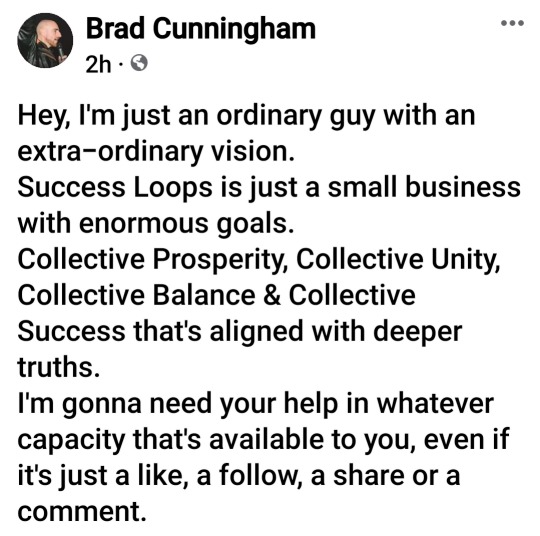#Global vision
Text
Hey, I'm just an ordinary guy with an extra-ordinary vision.
Success Loops is just a small business with enormous goals.

0 notes
Text
Greening the Future: Richard St. Barbe Baker's Environmental Legacy at the United Nations

View On WordPress
#Billion Tree Campaign#Canada#conservation#environment#Friends of the Saskatoon Afforestation Area#Global vision#Hugh Locke#Richard St. Barbe Baker AFforestation ARea#Saskatchewan#Saskatoon#tree planting#United Nations#World Development Information Day
0 notes
Link
Our collective responsibility should not only be to protect ourselves but also to make sure that our actions result in protecting the environment.
0 notes
Text
something The Discourse is missing is that in tandem with the benefits that the imperial core gains, in the view of democratic socialists, is the demsoc acceptance of who counts as the working class - which is evident in, for example, the work of Robert Reich, who says that expansion of the middle class should be the goal of democratic socialism, and that this relies on poverty to still exist. Western economics account for this! This is an acceptable cause for democratic socialism, even if demsocs themselves are oblivious to the ideology that underpins their work. Internationalism will always be at odds with something already deliberately disinterested in class consciousness.
#sorry context is the discourse on how expanding wages & welfare at the imperial core relies on exploitation of the global south#to which im contributing ‘but also their vision relies on poverty still existing in the imperial core as well’#i wrote this half asleep so i realize the clauses here are confusing and idk WHAT they were supposed to be omg
82 notes
·
View notes
Text
Holy shit almost passed out for the first time in my life just now wtf that shit's scary???
#someone fix global warming rn 'cause it's so hot my pressure went bye#holy shit yk when your vision goes blank and it feels like theres no world around you??? wtf#my anxiety kicked in too do i was having a full on panic attack in the middle of passing out#what a day 🤡 (only 11 in the morning)#air conditioner my beloved#🥨🪶
17 notes
·
View notes
Text
Somewhere in the Heavens … It is Waiting
14 notes
·
View notes
Text
intelligence is avoiding marvel hype in 2014 because it’s just mainstream money grubbing and we shouldn’t be shipping just any two male characters together
wisdom is realizing in 2023 that marvel really wrote the most heart wrenching queer tragedy of the century on accident and steve rogers and james barnes really did have that fucked up gay thing going on
#like they just did that#and released it in theatres globally#and said yeah#this is what the vision was#but it’s NOT gay
9 notes
·
View notes
Text

k global heart dream awards
#han jisung#stray kids#skz#mp#k global heart dream awards#pretty eyes tunnel vision#need a full body shot too bc THE FITTT 👀
9 notes
·
View notes
Photo

[The Daily Don]
* * * *
LETTERS FROM AN AMERICAN
April 27, 2023
HEATHER COX RICHARDSON
APR 28, 2023
Catie Edmondson and Carl Hulse in the New York Times yesterday noted that House speaker Kevin McCarthy (R-CA) cannot bring his conference together behind a budget plan. He wanted to pass a bill demanding major concessions from President Biden before the Republicans would agree to raise the debt ceiling, both to prove that he could get his colleagues behind a bill and to put pressure on the Biden administration to restore the old Republican idea that the only way to make the economy work is to slash taxes, business regulation, and government spending.
McCarthy was pleased to have passed his measure with not a single vote to spare, but it appears he got the vote because everyone knew it was dead on arrival at the Senate. According to Edmonson and Hulse, McCarthy got the bill through only by begging his colleagues to ignore the provisions of the measure because it would never become law. He urged them to focus on the symbolic victory of showing Biden they could unite behind cuts.
But today at the Brookings Institution, National Security Advisor Jake Sullivan outlined a very different vision of the global economy and American economic leadership. First of all, just the fact this happened is significant: Sullivan is a national security advisor, and he was talking about economics. He outlined how Biden’s “core commitment,” “his daily direction” is “to integrate domestic policy and foreign policy.”
Sullivan argued for a new economic approach to the challenges of the twenty-first century. The Biden administration is trying to establish “a fairer, more durable global economic order, for the benefit of ourselves and for people everywhere.”
The U.S. faces economic challenges, he noted, many of which have been created by the economic ideology that has shaped U.S. policy for the past 40 years. The idea that markets would spread capital to where it was most needed to create an efficient and effective economy has been proven wrong, Sullivan said. The U.S. cut taxes and slashed business regulations, privatized public projects, and pushed free trade on principle with the understanding that all growth was good growth and that if we lost infrastructure and manufacturing, we could make up those losses in finance, for example.
As countries lowered their economic barriers and became more closely integrated with each other, they would also become more open and peaceful.
But that’s not how it played out. Privileging finance over fundamental economic growth was a mistake. The U.S. lost supply chains and entire industries as jobs moved overseas, while countries like China discarded markets in favor of artificially subsidizing their economies. Rather than ushering in world peace, the market-based system saw an aggressive China and Russia both expanding their international power. At the same time, climate change accelerated without countries making much effort to address it. And, most of all, the unequal growth of the older system has undermined democracy.
Biden has attempted to counter the weaknesses of the previous economic system by focusing on building capacity to produce and innovate, resilience to withstand natural disasters and geopolitical shocks, and inclusiveness to rebuild the American middle class and greater opportunity for working people around the world.
After two years, the results have been “remarkable.”
Large-scale investment in semiconductor and clean energy production has jumped 20-fold since 2019, with private money following government seed money to mean about $3.5 trillion in public and private investment will flow into the economy in the next decade. Building domestic capacity will bring supply chains home and create jobs.
But this vision is not about isolating the United States from other countries. Indeed, much of the speech reinforced U.S. support for the positions of the European Union.
Instead, the U.S. is encouraging our allies—including developing nations—to build similarly to increase our united economic strengths and to enable the world to address climate change together, a field that offers huge potential for economic growth. The Indo-Pacific Economic Framework with 13 Indo-Pacific nations is designed to create international economic cooperation in that region, and the Americas Partnership for Economic Prosperity, which includes Barbados, Canada, Chile, Colombia, Costa Rica, the Dominican Republic, Ecuador, Mexico, Panama, Peru, and Uruguay, is designed to do the same here in the Americas. The U.S.-E.U. Trade and Technology Council and our trilateral coordination with Japan and Korea are part of the same economic program.
With this economic approach, the U.S. does not seek to cut ties to China, but rather aims to cut the risks associated with supply chains based in China by investing in our own capacities, and to push for a level playing field for our workers and companies. The U.S. has “a very substantial trade and investment relationship” with China that set a new record last year, and the U.S. is looking not to create conflict but to “manage competition responsibly” and “work together on global challenges like climate, like macroeconomic stability, health security, and food security.” “But,” he said, “China has to be willing to play its part.”
In today’s world, Sullivan said, trade policy is not just about the tariff deals that business leaders have criticized the administration for neglecting. It is about a larger economic strategy both at home and abroad to build economies that offer rising standards of living for working people.
The administration is now focusing on labor rights, climate change, and banking security in this larger picture. Through organizations like the Partnership for Global Infrastructure and Investment the administration hopes to mobilize hundreds of billions of dollars in financing in the next seven years to build infrastructure in low- and middle-income countries and to relieve debt there.
“The world needs an international economic system that works for our wage-earners, works for our industries, works for our climate, works for our national security, and works for the world’s poorest and most vulnerable countries,” Sullivan said. That means replacing the idea of free markets alone with “targeted and necessary investments in places that private markets are ill-suited to address on their own.” Rather than simply adjusting tariff rates, it means international cooperation.
And, Sullivan said, “it means returning to the core belief we first championed 80 years ago: that America should be at the heart of a vibrant, international financial system that enables partners around the world to reduce poverty and enhance shared prosperity. And that a functioning social safety net for the world’s most vulnerable countries is essential to our own core interests.”
This strategy, he said, “is the surest path to restoring the middle class, to producing a just and effective clean-energy transition, to securing critical supply chains, and, through all of this, to repairing faith in democracy itself.” He called for bipartisan support for this approach to the global economy.
Sullivan noted that the phrase “a rising tide lifts all boats” came from President John F. Kennedy, not from later supply-side ideologues who used it to defend their tax cuts and business deregulation. “President Kennedy wasn’t saying what’s good for the wealthy is good for the working class,” Sullivan said, “He was saying we’re all in this together.”
Sullivan quoted Kennedy further: “If one section of the country is standing still, then sooner or later a dropping tide drops all the boats. That’s true for our country. That’s true for our world. [And] economically, over time, we’re going to rise—or fall—together.”
“And that goes for the strength of our democracies as well as for the strength of our economies.”
Foreign policy journalist Laura Rozen noted that David Wessel of Brookings asked Sullivan for a quick summary of this new economic vision. Sullivan answered: “We’re at a moment now where we need to build capacity to build the goods & invent the technologies of [the] future & we’re going to make the investments to do that—us, +everyone who wants to be in on [the] deal. & then we’re going to build the resilience we need…so that no natural disaster or geopolitical shock can stop us from getting things we need when we need them….”
—
LETTERS FROM AN AMERICAN
HEATHER COX RICHARDSON
#Letters From An American#Heather Cox Richardson#Economy#JFK#brookings inst#Jake Sullivan#economic vision#the future#Middle Class#Democracy#global economy#we're all in this together
14 notes
·
View notes
Text

screaming crying throwing up god I still can’t believe this collab is finally real lightning is so perfect in this art style I LOVE THE RENDER THEY DECIDED TO BASE LIGHT’S ART OFF OF AND THIS TIME THEY BLESS US BY GIVING HER LEGS UNLIKE THE OG RENDER ITS BASED OFF OF,,,,LOOK AT THOSE LEGS LOOK AT THEM, HER THIGHS, IVE BEEN THINKING ABOUT THEM A LOT LIKE PLS,,,,,,,thank u wotv 😭😭💕💕
#I wuv her I adore her#when this collab comes out on global#i will be a mess 😭😭#lightning farron#ffxiii#ff13#ffbe#war of the visions
97 notes
·
View notes
Text
total drama island reboot, clone high reboot, heard through the grape vine that there is a new animated winx club...
girls, that monkey's paw's finger better curl one more time because i need a 6teen reboot titled 8teen where they all go to college - GIVE IT TO ME NOW
#need to see nikki as a global relations or art history major#caitlin fashion studies and jen sports medicine majors#wyatt music major HELLOOOO??? are we seeing the vision#jonesy of course will be a marketing/communications major and will open up a skate shop business with jude#sigh... ill shut up and draw it myself then
29 notes
·
View notes
Text
Me: at the rate I’m drawing the Hobbit comic, I will be out of the shire in like 20 years
Also me: *keeps obsessively thinking about how I’d handle certain moments in Mirkwood and the Misty Mountains and Laketown and Erebor*
#I have a pretty clear idea of how I want to handle Most of the subplots#I'll probably do illustrations of those moments at some point#drawing just takes so long and theres only so much i can complete before some global catastrophe makes sharing them impossible haha#but yeah!#i reread the hobbit in between emergency room visits#(over the summer — past tense of ‘read’)#and I really love the mirkwood chapters#but especially the eerie way the Company has those..enchantment-induced visions of Thranduil#the dreams of the magical hall full of the best food with the elf-king presiding over it#anYway anyone who says book thranduil is just a 'good guy' is incorrect and that's my hot take#he is VERY spooky#extremely sus
31 notes
·
View notes
Note
hi miles i need some medieval literature recs that are really pretentious so i sound smart and hot when i tell people i read them <3
I'm a big fan of my medieval ladies Margery Kempe and Julian of Norwich
also Hildegard von Bingen (Hildegard has some very gay letters with fellow nun Richardis), what's smarter and hotter than a lesbian polymath nun who did everything from music to science to medicine
La Vie de Sainte Euphrosine is fun and transgendery, as are Le Roman de Silence and Yde et Olive
Þrymskviða is a fun one (Thor has to dress up as a bride to steal his hammer back from a giant), also Volsunga saga is a classic
Marie de France's Lais are my all time fave medieval text, followed closely by Sir Gawain and the Green Knight
also a big fan of the Old English elegies, particularly The Wanderer, The Wife's Lament, and Wulf and Eadwacer
#this is very eurocentric sorry but most of my research focuses on global north Atlantic lit so like#England Ireland France Scandinavia etc#also this is a long list but I literally have my comps reading list open in front of me rn lmao#Would highly recommend Hildegard tho I love her stream 'vision (o euchari in leta via)' on spotify
10 notes
·
View notes
Note
HI FRANKIEEEEE what's my pokemon team :3c






ELI'S TEAM !!! ★
send an ask for a pokemon team !
#ok this team makes perfect sense to me but im not sure the vision is global u know#zoroark DUH and a little hisuian zorua for him to take care of#glameow is just perfect for u i think somehow#cubone i was set on from the START and i couldnmt even tell u why i think its just cus hes so sillay#espurr and marshadow just make me laugh why r they stood like that. and u make me laugh so it works#they just look like little bodyguards but like confused at the same time it makes me giggling#HATEMAIL
2 notes
·
View notes
Text
my brain is on fire ask me things about Time Travel Fixit Isekai Loqi
4 notes
·
View notes
Text

2 notes
·
View notes